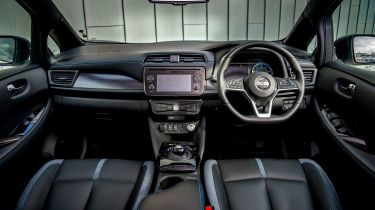Nissan Leaf review: interior, dashboard & infotainment
The Leaf’s interior is perhaps the most obvious area in which it’s starting to feel its age
Unlike some other electrified models, the Nissan Leaf is fairly conservatively designed inside. That means there are few sweeping lines and neon-lit panels, just a fairly plain-looking centre console and a set of part-digital dials. This may please buyers trading up from regular family hatchbacks, but those looking for a plethora of on-board technology and screens may be disappointed. It looks especially dated next to the new Nissan Ariya, but even the bargain MG4 feels more modern inside.
Nissan Leaf dashboard
Like a slice of unbuttered white bread, the Nissan Leaf’s cabin does what it needs to, but is seldom going to excite anyone. All cars do get an eight-inch touchscreen, but most functions are controlled by an array of traditional buttons and switches – somewhat refreshing when more and more manufacturers are integrating almost all of a car’s functions into screens and other touch-sensitive displays.
That’s not to say the Leaf’s interior is totally without any neat design tuches; we like the blue stitching on the seats, which act as a nod to the car’s electric powertrain, while the part-digital instrument cluster is easy to read and displays all the information you expect, from speed, to range and trip information.
As you can expect from a budget electric car, the materials used within the Leaf’s cabin aren’t exactly what you’d call luxurious. The standard-fit leather-trimmed steering wheel feels tactile and there are a handful of soft-touch plastics used in high-touchpoint areas, but there is also plenty of cheap-feeling trim that makes the already dark-feeling cabin feel even more drab. An MG4, despite costing slightly less, feels better built inside.
Equipment, options & accessories
As of summer 2023, the Nissan Leaf is offered in four trim levels: Shiro, Acenta, N-Connecta and Tekna – the long-range e+ is only available in the latter two. The entry-level Shiro model is the most recent introduction to the Leaf line-up and is perhaps the most interesting because Nissan says it’s based on the mid-spec N-Connecta trim, but represents a huge £2,000 saving over the price of that car. Only available in white, Shiro cars get Nissan’s full suite of ProPilot driver assistance systems as well as 17-inch alloy wheels, part-synthetic leather upholstery, heated front and rear seats, a reversing camera and an eight-inch infotainment system which we’ll discuss in more detail later.
Next up is the Acenta which, strangely, has less standard equipment despite costing more – although it is offered in more colours than just white. Opting for an Acenta model means you’ll forgo things such as adaptive cruise control and lane-keep assist, as well as swapping the Shiro’s heated leatherette seats and 17-inch wheels for plain-old cloth ones and a set of 16-inch alloys. With this in mind, we think the Shiro is the new pick of the Leaf line-up if you don’t want to upgrade to the larger battery.
Most, however, probably will want the extra range of the e+ car, with the cheapest way into it being via the mid-spec N-Connecta. This builds on the Acenta’s specification with 17-inch wheels, front and rear parking sensors, heated seats, a heated steering wheel and power-folding mirrors.
At the top of the line-up is the Acenta which, like the N-Connecta, is available only with the larger battery. This gets luxuries such as leatherette and suede upholstery, full-LED headlights and a BOSE sound system.
Infotainment, apps & sat nav
Like many aspects of the Nissan Leaf, the car’s touchscreen does the job, but is far from class-leading these days. The relatively low-res display allows you to plot a route that takes in public charging stations on the way, and features Apple CarPlay and Android Auto – handy given Nissan’s operating system is a bit clunky and lacking in features. The standard stereo is decent, but the Bose upgrade will please keener ears.
Many Nissan Leaf owners will like having the NissanConnect EV app, which allows you to check the car’s battery charge, remotely start the charging and even set the air-conditioning. Other features include a location service to prevent you losing your car in the car park, and a route planner. It’s all useful stuff, but the app can be slow to operate and we found it sometimes even failed to connect to the car at all, which is why it gets a poor sub-two-star rating on the app store.

